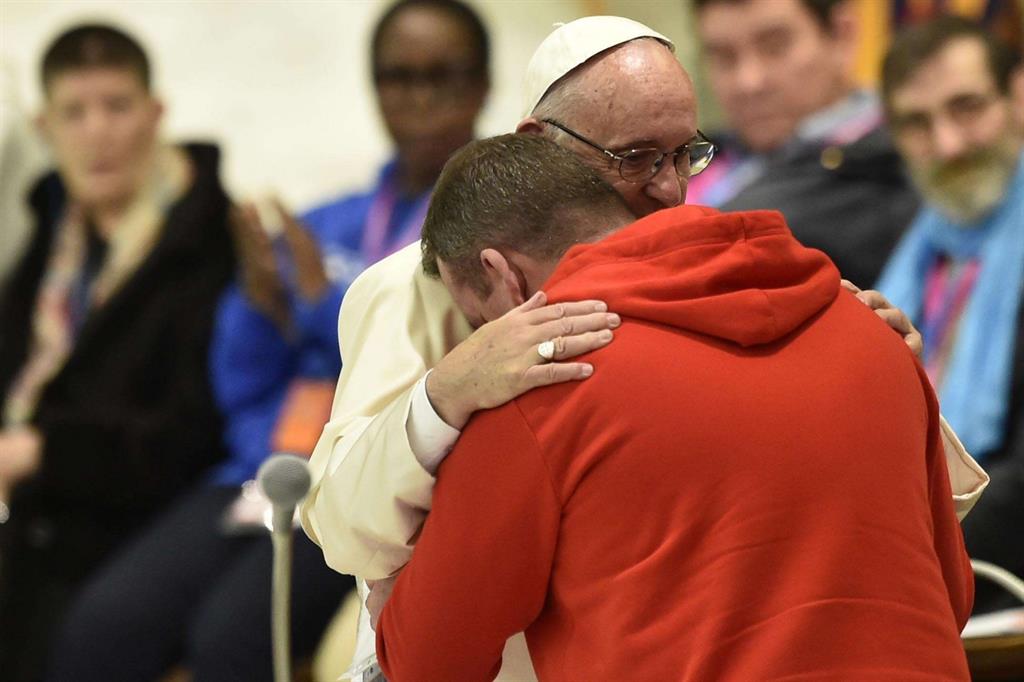World day
Hope could illuminate all of our steps, erecting bridges of liberation and avenues of embrace as we follow the path leading us to the Face of the Father. We should not be ashamed because we enjoy our day while our brothers and sisters are agonizing on a barge or in a dump in search of food to survive. Everything is in our own hands that can open our ears and enable us to tune in

Gospel proclamation, if the Ear of humankind is not overgrown with nettles, as Nelly Sachs described them, but with overwhelming fake news, hammering advertisements, self-glorification of our bodies, is a powerful blow that awakens our conscience, for it makes us understand
The distance separating our way of life from that of the world that praises, pursues and imitates all those who have power and wealth, while marginalizing the poor, considering them something to be discarded and to be ashamed of.
If we allow ourselves to be enticed by what is foisted on us, presented as the laissez-passer to acceptance into given social environments, we will be losing ourselves and the very meaning of life. When the term “waste” becomes an integrating part of our language thereby shaping our imagination, a terrible step – not definitive but decisive – has already been taken, affecting our standard of judgement that we conceal with a phoney and concocted term … “evaluation.” We forget because we remove and thus those principles, as conspicuous as our act of breathing, grow increasingly harmful because we find them hard to position: has anyone ever chosen their parents, has anyone ever chosen the place where they were born?
Thus human laceration is entrusted to chance or to Fortuna and thus the human laceration we witness every day is normal and justified.
To consider a person shaped by the hands of the Creator as “waste”, one who inherently carries His seal, is a serious insult to the Most Holy, for He is the One and Only who makes no exception, for everyone is His son or His daughter. Undoubtedly, the acknowledgement of destitution, acknowledging the existence of those living and sleeping in cardboard boxes, ripped and soiled, raises feelings of shame. Of which nature? Is it a shame that conveys rejection, disdain, physical detachment due to repulsion or is it deep-rooted shame, a sound feeling of shame that shatters our comfort zone, our luxuries, our vision of everyday life that yearns to possess whatever stands as a status symbol and deceives us into the yearning to be acknowledged as upper class? Not everyone is called to share in full the poverty of a slum, as Marcella does, a consecrated woman in Haiti, indistinguishable from those who surround her.
 But everyone is called, invited, encouraged, to find their own way to embrace the poor, stripped by a system that we nurtured and fostered, to restore their dignity.
We are closed in our own expectations, in our plans (whether successful or unsuccessful is yet unknown …), in the laborious quest for self-gratification that fails to make us grow. We are like those geese we fight for, forcibly gorged to produce, or those caged hens that live only to get fat. Indifference then grows out of proportion, and we do not realize the danger we are running. Francis shows us how to tear down this barrier:
But everyone is called, invited, encouraged, to find their own way to embrace the poor, stripped by a system that we nurtured and fostered, to restore their dignity.
We are closed in our own expectations, in our plans (whether successful or unsuccessful is yet unknown …), in the laborious quest for self-gratification that fails to make us grow. We are like those geese we fight for, forcibly gorged to produce, or those caged hens that live only to get fat. Indifference then grows out of proportion, and we do not realize the danger we are running. Francis shows us how to tear down this barrier:
It is often the poor who undermine our indifference, which is the daughter of a vision of life which is too imminent and bound up with the present.
If our ears were free, our creativity would expand and would surprise us along those roads, performing concrete gestures, showing closeness, friendship and shared fraternity. Thus a confident, serene posture would break free within ourselves:
The cry of the poor is also a cry of hope which manifests the certainty of being liberated. This hope is founded upon the love of God who does not abandon those who trust in Him (Cf. Romans 8:31-39).
Hope could illuminate all of our steps, erecting bridges of liberation and avenues of embrace as we follow the path leading us to the Face of the Father. We should not be ashamed because we enjoy our day while our brothers and sisters are agonizing on a barge or in a dump in search of food to survive. Everything is in our own hands that can open our ears and enable us to tune in.